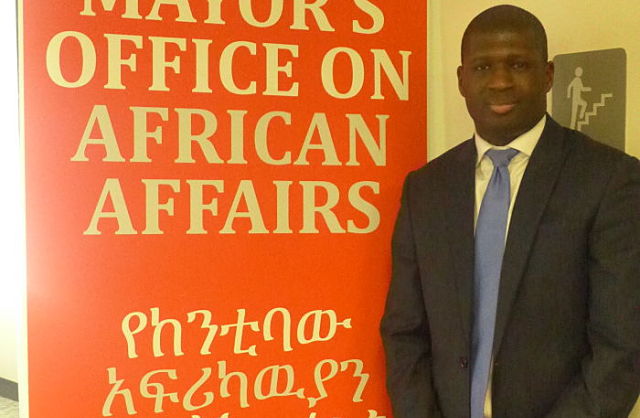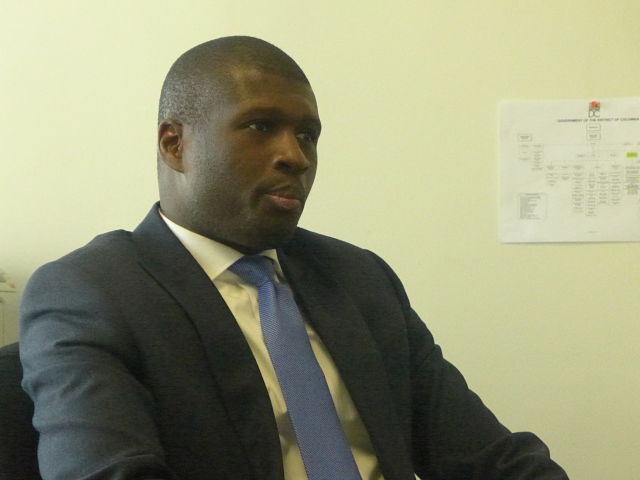 Mamadou Samba is the Director of the D.C. Mayor's Office on African Affairs, (Photo: Tadias Magazine)
Mamadou Samba is the Director of the D.C. Mayor's Office on African Affairs, (Photo: Tadias Magazine)
Tadias Magazine
By Tadias Staff
Published: Friday, March 6th, 2015
Washington, D.C. (TADIAS) — Last week, we sat down for an interview with the new Director of the Washington, D.C. Mayor’s Office for African Affairs, Mamadou Samba, who was appointed by Mayor Muriel Bowser in January 2015. Prior to his current job Samba was Commissioner of the DC Commission on African Affairs, and worked as a Capital Budget Administration Analyst at the DC government Office of the Chief Financial Officer. He moved to the U.S. in the early 1990′s from Dakar, Senegal as a young adult (his father worked at the Senegalese embassy). After his dad’s term ended, Mamadou said, he chose to stay in order to finish his education, and went on to earn a Master of Public Administration degree from Kennesaw State University, and a Bachelor Degree in Political Science from the University of South Carolina Aiken, where he was awarded an NCAA athletic scholarship.
When we arrived at his office inside the Reeves Center at the corner of 14th and U Street, Samba had been working on a speech that he would deliver the following evening at the Ethiopian Community Center on the eve of the 119th Adwa anniversary. “I have a lot of respect for the Ethiopian community in D.C., for Ethiopian history and Ethiopians in general,” he told us. “You guys are the reason why we now have such a strong African community in Washington.”
The D.C. Mayor’s Office for African Affairs, which is the first of its kind in the United States, was created in 2006 following a series of community demands. Samba explained: “There was a need to have an office to help support the fast-growing African immigrant community and also serve as a liaison between the African population and the district’s government.” The task, he added, was to open “an office that was aware of the barriers — language and cultural barriers — and the challenges of dealing, for instance, with lack of information on jobs, health insurance, and immigration matters. So our office came as result of that,” he said. “We may speak different languages and have different taste in music, but employment is a challenge in all of our communities not only just in the Ethiopian community; immigration is a problem not just in the Ghanaian community. So the point is unless we come together as a community we will always remain separated. And we have to be inspired by the Latino community, by the Asian community and other immigrant communities.”

Mamadou Samba. (Tadias Magazine photo)
In the past, Samba emphasized, “People who have served as directors before me have done a really good job making sure that the office is stable over time.” He added: “So we will keep building on that to make sure that the African immigrant community is more aware than before and has more access than before to services that every resident of the district has access to. We do that by putting in place several types of programs. We have a grant that we use to fund non-profit organizations that serve in different sectors, it could be health, education and other key areas in line with the Mayor’s priorities.”
Aside from that Samba noted that his office also conducts activities that are particularly geared towards empowering young people. “These programs are designed to get African youth engaged, trying to provide them with work experience, leadership opportunities, and just really trying to give them a platform to be part of the discussion,” he said. “But the most important program is our capacity building program where we support small business entrepreneurs and non-profit organizations.” He noted “We do that through workshops an business trainings so they can learn where to find funding, what kind of funding is out there and available for them, how to research and write grants, really put them in touch with each other and to resources.”
“So what’s your goal as the new director?” we asked. “I am going for a more collaborative approach,” he said. “Because I find that as someone who has been here for a long time that our community is not as united as we want it to be.” He added: “There isn’t a lot of intercultural interaction. What I mean by that is Ethiopians are doing things on their own, Nigerians are doing things on their own, Ghanaian are doing something on their own, Senegalese are doing something on their own.” Samba continued: “But when you look at it each one of them is doing the exact same thing that the other one is doing. The only difference is that these are cultural or country focused efforts. So I think there has to be a way for us to work together on commons issues.”
“The Ethiopian community has to be able to go walk with the Ghanaian community because they are more experienced, they outnumber all other immigrants from the continent, so there is something there that we can learn from the Ethiopian community,” Samba said. “There is something that we can learn from the Ghanaian community.”
“The other thing I want to contribute to the office is in raising the visibility of the success within our community,” he said. “We have to tell our own stories. We have to highlight the positive things that your organization is doing, we have to talk about the positive things that other Africans are doing to balance the bad news that we hear daily about Africa.” Samba points out that his office has published a business directory listing African owned businesses in Washington, D.C. covering many sectors from hair braiders to restaurateurs, to proprietors of parking lot management companies, realtors, lawyers, and insurance agents.
“We know that the African Diaspora sends 50 billion dollars annually in remittances to Africa, and that’s projected to reach 250 billion in the next two decades,” Samba said. “What I want to make equally visible is the huge economic impact that African immigrants are making right here in Washington, D.C. in terms of job creation, tax revenue and cultural enrichment of the District.”
—
You can learn more about the D.C. Mayor’s Office on African Affairs at oaa.dc.gov.
Related:
Good Question: Where Do African Immigrants Live in US? Interactive Map
Join the conversation on Twitter and Facebook.

























